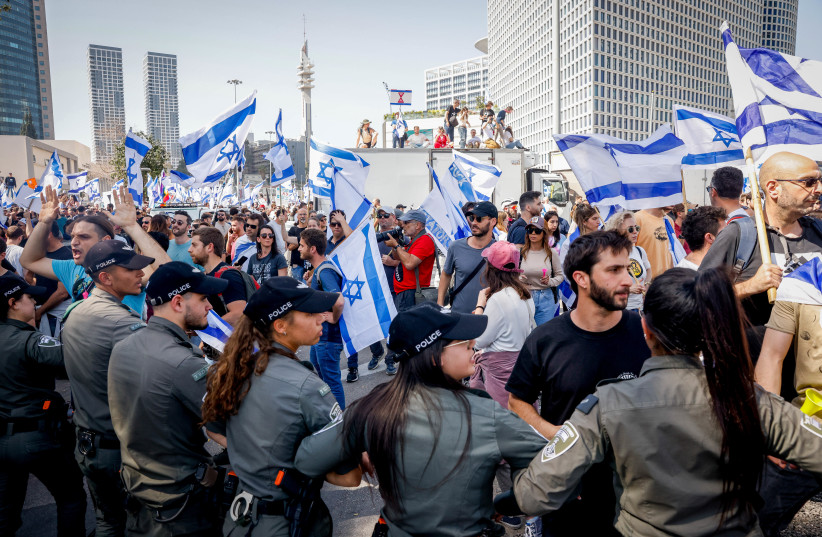Prime Minister Benjamin Netanyahu spoke to the nation on Wednesday night and compared the rioters who torched cars and houses in Huwara on Sunday night to the anti-judicial reform protesters in Tel Aviv who demonstrated throughout the day on Wednesday.
Before even breaking down the radical inaccuracies of such a statement, the language he used already says a lot: for Israel’s prime minister the people who rampaged through a Palestinian village in search of people to kill were simply rioters like the protesters in Tel Aviv.
“We won’t accept violence, police beating, blocking of roads,” Netanyahu said. “We will not accept lawbreakers and violence, not in Huwara, not in Tel Aviv, not anywhere… In a democracy, there are clear rules about how to have a debate. There are redlines that cannot be crossed and it does not matter how deep, stormy and emotional the debate is. The sharp and clear redline is that violence and anarchy are absolutely forbidden.”
Frivolous and inaccurate
Opposition leaders were quick to condemn his commentary as frivolous and inaccurate. “Huwara was a pogrom carried out by terrorists,” Opposition leader Yair Lapid said, highlighting that the protesters in Tel Aviv were exercising their democratic right to demonstrate.
In reality, the events that occurred in Huwara – which happened in response to the tragic murder of brothers Hallel Menachem Yaniv and Yagel Ya’acov Yaniv in a terror attack on Sunday – were worlds away from the demonstrations in Tel Aviv and throughout the country carried out by the opponents to the judicial reform.

At those demonstrations, people waved flags, played instruments, yelled and carried out several targeted events.
Protesters did clash with Israel Police on numerous occasions. However, there were no confirmed examples of police being physically attacked as the prime minister and several other members of the coalition claimed. In fact, there were several reports of peaceful demonstrators being arrested along with those who were disruptive.
The protesters continued to argue from start to finish that they are demonstrating to protect democracy in Israel and their country from what they perceive as a threat to its very existence.
The police responded by bringing in water cannons and stun grenades aimed at the protesters, several of whom were injured. One protester went into emergency surgery; another had his ear partially blown off by a stun grenade.
Meanwhile, the complaint by coalition members, namely National Security Minister Itamar Ben-Gvir, was that central streets were blocked, as often occurs during major demonstrations.
A different image
In Huwara, we saw a very different image.
Jewish extremists living in the West Bank entered the town where a terror attack had occurred earlier in the day, torched Palestinian houses and cars, and attacked Palestinians living there. This was a targeted attack against innocent people, although Hurawa has long been a hotbed of terrorist activity.
Footage from the town showed large fires that broke out amid the clashes and a number of Palestinian families had to be rescued from burning homes.
The following day, the rioters reentered Huwara and began attacking the Palestinian residents again. Shopkeepers in the town were ordered by the IDF not to reopen their shops for the next few days as part of attempts to calm the situation in the area.
As a result, the IDF sent in four battalions to reinforce Israeli security forces already acting to stop violence in the West Bank. The soldiers fired tear gas to separate the rioters and the Palestinians, and several soldiers and officers were attacked, including the commander of the Binyamin Brigade.
These rioters are nothing like the protesters in Tel Aviv. They are vigilantes; they did not take the law into their own hands, as many are reporting, because in no shape or form is this the law. Instead, they decided that they knew how to exact a price from innocent people and acted violently accordingly. The demonstrators in Tel Aviv did not perpetrate a targeted attack on innocent civilians.
Netanyahu’s choice to deny this difference and to instead equate these two vastly different events is an attempt to incite against the protesters by comparing them to criminals. This is simply wrong.
